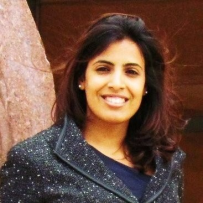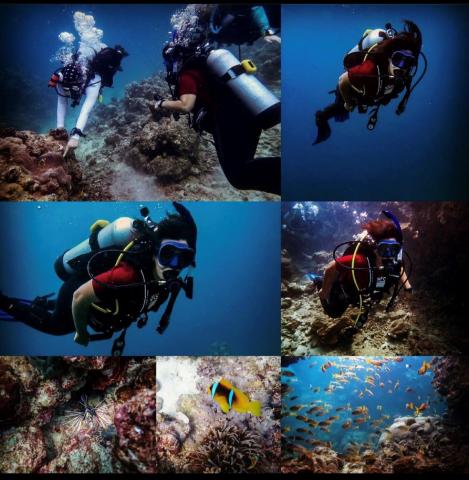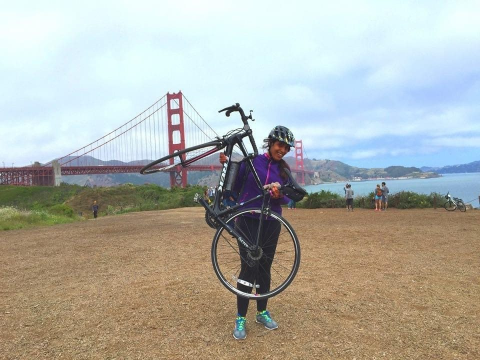The Middle East region — particularly the Kingdom of Saudi Arabia (KSA) — is in a period of rapid growth, largely driven by ambitious plans for transformation. This brings exciting opportunities to mobilize our capability and be a part of the transformation, creating a more connected, sustainable world for tomorrow.
For this feature, Middle East Social Value Lead Mala Alahmadi gives insight into her role at Jacobs and shares her experience growing up in the KSA and returning to the country as an adult after seven years of studying abroad.
Meet Mala:
Since joining Jacobs two years ago, I’ve had the opportunity to work on numerous projects as part of the strategic consulting team, helping to shape the future of sustainability and social value in the KSA. From the moment I walked into the office, I knew this was a team I wanted to be a part of.
I currently lead the social value advisory group, which is a high calibre team of economists, project managers and consultants in the policy and governance space. The varied work we do is human-centered and brings people to the core of decision making, creating a positive impact on the wellbeing of our communities. I’m constantly learning and growing with the help of people and projects in our region and around the world. We have a talented, supportive and tight-knit team that genuinely enjoys working together as well as delivering the work we do — work that truly makes a difference for our global communities every day.
But how did I get to where I am today?
Let’s go back to the start
I was driven from a very young age to make a difference to the places where people live to improve quality of life and wellbeing. I was born and raised in Yanbu Industrial City, a modern coastal city of approximately 100,000 people in the KSA. I developed an early interest in civil engineering, recognizing the vast differences between the well-organized, picturesque port city I grew up in and my grandmother’s hometown where the infrastructure and built environment was different. When we would visit my grandmother, there were obvious differences in the quality of life and a big part of this was the less developed infrastructure where she lived. It made a huge difference to its walkability and people’s ability to get out and about, which consequently impacted their wellbeing.
This was when my quest to study civil engineering began, as I knew this career path would enable me to create a real impact in our communities.
Forging my own path
My family is progressive, so many of the restrictions around guardianship of women that remained strict during the time I grew up in the KSA were more relaxed for me and my sisters. My parents were fully supportive of my educational aspirations, so when I graduated high school in 2005 with a good score and was ready to go to university, we started to look at civil engineering programs locally. However, we couldn’t find any programs available to women in the vicinity.
After my family unsuccessfully tried to convince me to study math and become a teacher, we found a compromise. My parents found an architectural engineering degree a little further away where I could study. Architecture was not really what I wanted to do, but it was the closest thing to civil engineering in the country being offered to women at the time, so I agreed, packed my bags, moved across the country and decided to stay on campus.
I was used to relatively lenient rules at home — my sisters and I were able to move around freely to exercise, cycle and get what we need from the bookstore and grocery store on our own. However, on campus, the rules for women were more conservative so I was required to have a male companion to go out, even to buy things I needed for my course like architecture studio supplies. This was difficult without my family nearby.
I was frustrated with the restrictions and the imbalance this caused between female students who had male family members nearby, and students like me who were staying on campus. I decided to act. I wrote a letter and met with the Dean of the university who agreed to change the rules and let the architecture students living on the campus have more visits to the bookstore and art shops through a dedicated driver.
While pleased with the greater flexibility afforded to me and other students, I still had strong aspirations to study civil engineering. With rules stipulating Saudi nationals can only hold one bachelor’s degree at the time, I decided to cut my study short and seek out my true calling. I had learned so much from the time I spent studying architecture, but I knew it wasn’t for me. I knew the only way to pursue civil engineering would be to travel to a different country and get a country-sponsored scholarship. I did just that — so midway through the architecture degree, with my family’s full support, I moved over to the U.S. and enrolled at the University of Kansas.
Culture shocks
In Kansas, I quickly made new friends and settled easily into my civil and environmental engineering degree. I adapted quickly — it was wonderful to be able to easily get involved with volunteering activities and work part-time. I loved it.
After completing my undergraduate degree, I moved to Silicon Valley in northern California to study for my master’s degree in civil and environmental engineering. I loved California’s lifestyle and warm year-round climate and made treasured memories and life-long friendships. However, life in Silicon Valley is also fast paced and intense and I found there was less time for socializing than I had been used to in Kansas — it was so busy we’d have to deliberately schedule time for socializing even just for a quick catch-up. It was a lot of work and less play — I hadn’t expected such a vast difference studying within the same country.
On completion of my master’s degree and a bucket list road trip, I returned home to the KSA and experienced a surprising and different type of cultural shock because of the many changes that had occurred as part of Saudi Vision 2030 — a unique transformative economic and social reform blueprint that is opening Saudi Arabia up to the world. I particularly noticed the increased focus on local identity and women empowerment as I have witnessed more women leaders at the forefront of sustainability and development, and a huge focus on youth education and empowering them to contribute to the local content and diversifying the economy.
Despite the changes in the region, it is great to see that the fundamentals of the Saudi culture — strong family values and connected community — haven’t changed. The changes have led to greater freedom in how the community interprets their own value system outwardly, and women particularly feel freer to be themselves, however, our strong family values and sense of community remains the same. The people in the KSA are very relaxed, generous, and eager to help one another — even total strangers — so despite the changes that had happened while I was away, I settled back into Saudi life quickly.
A seat at the table
On returning to the KSA, I secured a job as an environmental specialist within a governmental ministry. There weren’t many women in the committees I participated in, and I was one of the youngest, so I expected to be somewhat on the sidelines — but this couldn’t have been further from the truth. Though the committees were heavily male dominated, I was always asked for my opinion and contributions. I took this lesson with me to always ensure everyone has a voice in discussions.
The best bit? Many workplaces in the region are catching up. There is a big push to get more women not only into workplaces but also into leadership positions as part of Vision 2030.
Aligned with Jacobs’ values
After I left the ministry, my next role was as a natural resources management specialist — an experience that was unforgettable. I worked with so many diverse people and learned so much about innovation in natural resources management and the circular economy due to geopolitical constraints, as well as climate change mitigation and adaptation measures for projects in the Middle East and North Africa.
During the COVID-19 pandemic, I was thinking about my priorities and what direction I wanted to take, like many others did at that time. I knew I still wanted to make a difference through my work in civil engineering around sustainability and climate change, I just wasn’t sure which way was next. I interviewed at Jacobs and another company and was offered great roles at both organizations.
I chose Jacobs because of the clear alignment of the Jacobs values with my own values, particularly around inclusion, wellbeing and sustainability, as well as the opportunity for growth in my chosen field and the difference I wanted to make in the civil engineering and sustainability space. I knew I had to listen to my own inner voice and go with the opportunity that felt right. That was Jacobs — and I haven’t looked back.
About the author

Mala Alahmadi started her career as a civil and environmental engineer on water resources and urban development projects with non-profit organizations; has worked internationally across various projects and in challenging conditions; and has the experience working for government organizations. Mala has led transformational initiatives and projects to provide sustainable outcomes, solve critical natural resources issues and develop strategies, policies and action plans in the KSA, the United Arab Emirates, the Middle East, the U.S., Mexico and Bolivia. During her free time in the KSA, she enjoys hiking, scuba diving, camping and enjoys playing board games with friends.














































